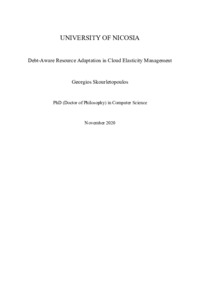- Skourletopoulos, Georgios
- School of Sciences and Engineering |
- Department of Computer Science
- 2021
- English
- 217 pages
- Mavromoustakis, Constantinos | Sahalos, John | Mastorakis, George
- Cloud computing | Cloud elasticity management | Debt-aware | Elasticity debt | Game theory | Hidden markov model | Multi-tenant software as a service | Resource adaptation | Resource provisioning | Resource utilization | Service composition | Service utility
- Sciences and Engineering -- Computer Science
-
-
Cloud computing is a well-consolidated paradigm for on-demand provisioning of computing and storage resources that is highly motivated by economies of scale. Elasticity is a fundamental property of cloud computing that enables to maintain, grow or shrink virtual resources while handling the arbitrary workload variation. This research thesis motivates the need for resource adaptation decisions valued from an innovative economics-driven methodology that considers the trade-offs of compromising long-term benefits for short-term gains as a dimension to mitigate imperfections when adapting resource provisioning under the uncertainty of the cloud environment. In this sense, the technical debt metaphor is mapped in the context of cloud elasticity management and service composition. The topic of technical debt has gained significant traction in the software engineering community and it is used to encapsulate numerous long-term quality problems as a result of the acceleration of the velocity when developing and releasing software. Drawing the analogy between technical debt and cloud elasticity, the elasticity debt term is formed as the disruptive solution concept for optimal resource adaptations with value creation and strategy-driven incentive mechanisms in multi-tenant software as a service cloud environments. Elasticity debt refers to the suboptimal adaptations or conflicting trade-offs responsible for affecting the utility of the system or application owner. One of the aspects of dynamic resource adaptation is that, due to workload variations, the composition encounters underutilization or overutilization on the composite service components. In the underutilization state, the pay-off is significant in the long run with far-sighted benefits, while in the overutilization state, there is no pay-off and, if exists, it is trivial. Such a definition matches the intentional and unintentional technical debt encountered in software engineering.
In this context, this research work elaborates on a complete solution to debt-aware dynamic resource adaptation in cloud elasticity management with value creation- and strategy-oriented reasoning. The goal of this work is to optimize the resource provisioning and utilization in cloud-centric systems under balanced, well-compromised trade-off decisions. The novel contributions and impact of this research project on the theory and practice of cloud elasticity management are the following:- A theoretical, economics-driven framework to support value creation in cloud elasticity management and service composition leveraging the technical debt metaphor.
- Novel debt-aware models and algorithms with value creation and strategy-driven considerations to reason about elasticity resource adaptations, embracing the approach of unavoidable gaps in resource provisioning between the resource supply and demand and quantifying the interest during the overutilization or underutilization states of the composite service component utility as a result of the dynamic fluctuations in request workload to drive elasticity adaptations.
- Novel game theoretic control mechanisms with debt-aware elasticity considerations, formation of dynamic coalitions and optimization of trade-off decisions for optimal resource utilization and exchange of resource capacity in multi-tenant software as a service cloud environments. The analysis of the utility-driven state of debt minimization and profit maximization is presented from the service provider viewpoint based on a novel Hidden Markov Model, followed by a novel mobile opportunistic offloading model in the mobile cloud computing framework for task offloading on the cloud after denial by two mobile device nodes in close proximity due to resource restrictions.
- Implementation of a prototype tool for debt-aware quantification at cloud service utility level through the integration of the designed models and algorithms, allowing the provision of quantitative reports, dashboards and insights into the overutilization and underutilization states of service components in multi-tenant applications hosted in the cloud.
-
Debt-Aware Resource Adaptation in Cloud Elasticity Management
Main Files
| Type | Location | Link |
|---|---|---|
| dissertation | [More information] |


